Top 10 Things You Should Never Do at the Doctor's Office
Alright, picture this. You've got an appointment at the doctor's office scheduled. Maybe it's your regular check-up, maybe you've got a nagging cough that just won't quit, or maybe there's this weird rash on your arm that's making you wonder if that camping trip last weekend was really worth it. But, let's be real. No matter the reason, most of us would rather be doing anything else than sitting in a sterile room, waiting to be poked, prodded, and questioned about our dietary habits.But here's the thing: we all need to go to the doctor. And we need our doctors to be able to do their jobs effectively. I mean, we want the correct diagnosis, right? Not something that's been clouded by, I don't know, our refusal to admit how much fast food we really eat, or our inability to remember exactly what vitamins we're popping each morning. Doctors are kind of like detectives, you see. They're there to figure out what's going on in our bodies, to spot the signs and symptoms we might not even notice, and to make sure we get the right treatment to feel better.
Now, there's a way to make this process a lot smoother. Think of it as the 'dos and don'ts' for doctor's appointments. You might be surprised by how much the success of a doctor's visit can be influenced by our own actions and habits.
The Top Ten
1 Lie about your symptoms or health history
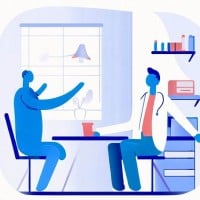 Always be honest and transparent with your doctor about your symptoms, medical history, and lifestyle habits. Withholding or distorting information can lead to misdiagnosis or inadequate treatment.
Always be honest and transparent with your doctor about your symptoms, medical history, and lifestyle habits. Withholding or distorting information can lead to misdiagnosis or inadequate treatment.
 Always be honest and transparent with your doctor about your symptoms, medical history, and lifestyle habits. Withholding or distorting information can lead to misdiagnosis or inadequate treatment.
Always be honest and transparent with your doctor about your symptoms, medical history, and lifestyle habits. Withholding or distorting information can lead to misdiagnosis or inadequate treatment.
2 Ignore hygiene practices
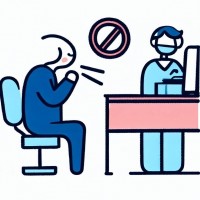 Not washing your hands, covering your mouth when coughing, or using tissues and disposing of them properly can spread germs, potentially causing infection.
Not washing your hands, covering your mouth when coughing, or using tissues and disposing of them properly can spread germs, potentially causing infection.
 Not washing your hands, covering your mouth when coughing, or using tissues and disposing of them properly can spread germs, potentially causing infection.
Not washing your hands, covering your mouth when coughing, or using tissues and disposing of them properly can spread germs, potentially causing infection.
3 Leave out details about medications and supplements
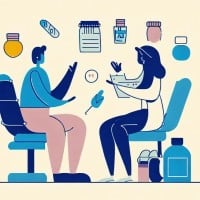 You should provide complete information about any prescription medications, over-the-counter drugs, or supplements you are taking. These can interact with new medications your doctor may prescribe.
You should provide complete information about any prescription medications, over-the-counter drugs, or supplements you are taking. These can interact with new medications your doctor may prescribe.
 You should provide complete information about any prescription medications, over-the-counter drugs, or supplements you are taking. These can interact with new medications your doctor may prescribe.
You should provide complete information about any prescription medications, over-the-counter drugs, or supplements you are taking. These can interact with new medications your doctor may prescribe.
4 Ignore doctor's instructions for pre-visit preparations
 If your doctor requests that you abstain from eating, drinking, or taking certain medications before your visit, be sure to follow their instructions. Failure to do so can affect test results and diagnosis.
If your doctor requests that you abstain from eating, drinking, or taking certain medications before your visit, be sure to follow their instructions. Failure to do so can affect test results and diagnosis.
 If your doctor requests that you abstain from eating, drinking, or taking certain medications before your visit, be sure to follow their instructions. Failure to do so can affect test results and diagnosis.
If your doctor requests that you abstain from eating, drinking, or taking certain medications before your visit, be sure to follow their instructions. Failure to do so can affect test results and diagnosis.
5 Interrupt the doctor constantly
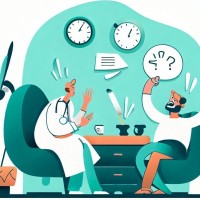 While it's important to ask questions and express your concerns, constant interruption can distract the doctor and may cause important information to be missed.
While it's important to ask questions and express your concerns, constant interruption can distract the doctor and may cause important information to be missed.
 While it's important to ask questions and express your concerns, constant interruption can distract the doctor and may cause important information to be missed.
While it's important to ask questions and express your concerns, constant interruption can distract the doctor and may cause important information to be missed.
6 Use your phone during the examination
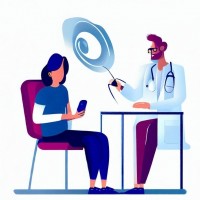 Unless it's absolutely necessary, refrain from using your phone during your appointment. This can distract both you and the doctor, and could lead to missed information or misunderstandings.
Unless it's absolutely necessary, refrain from using your phone during your appointment. This can distract both you and the doctor, and could lead to missed information or misunderstandings.
 Unless it's absolutely necessary, refrain from using your phone during your appointment. This can distract both you and the doctor, and could lead to missed information or misunderstandings.
Unless it's absolutely necessary, refrain from using your phone during your appointment. This can distract both you and the doctor, and could lead to missed information or misunderstandings.
7 Neglect to provide updated information
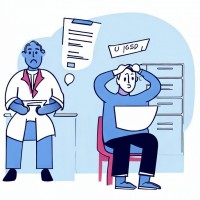 Always inform your doctor of any changes in your health since your last visit, including new symptoms, allergies, or changes in your medical history.
Always inform your doctor of any changes in your health since your last visit, including new symptoms, allergies, or changes in your medical history.
 Always inform your doctor of any changes in your health since your last visit, including new symptoms, allergies, or changes in your medical history.
Always inform your doctor of any changes in your health since your last visit, including new symptoms, allergies, or changes in your medical history.
8 Refuse to comply with necessary tests or procedures
 If a doctor recommends certain tests or procedures, it's because they believe these are essential for accurate diagnosis and treatment. Refusing to comply can obstruct the diagnostic process.
If a doctor recommends certain tests or procedures, it's because they believe these are essential for accurate diagnosis and treatment. Refusing to comply can obstruct the diagnostic process.
 If a doctor recommends certain tests or procedures, it's because they believe these are essential for accurate diagnosis and treatment. Refusing to comply can obstruct the diagnostic process.
If a doctor recommends certain tests or procedures, it's because they believe these are essential for accurate diagnosis and treatment. Refusing to comply can obstruct the diagnostic process.
9 Bring unnecessary people into the examination room
 While it's sometimes helpful to bring a family member or friend for support or to help remember important details, having too many people in the room can be distracting and hinder the examination process.
While it's sometimes helpful to bring a family member or friend for support or to help remember important details, having too many people in the room can be distracting and hinder the examination process.
 While it's sometimes helpful to bring a family member or friend for support or to help remember important details, having too many people in the room can be distracting and hinder the examination process.
While it's sometimes helpful to bring a family member or friend for support or to help remember important details, having too many people in the room can be distracting and hinder the examination process.
10 Argue about the necessity of the physical examination
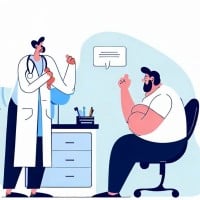 Physical examinations are a critical part of the diagnostic process. Arguing or being uncooperative about the necessity of a physical examination can make it difficult for the doctor to thoroughly evaluate your condition.
Physical examinations are a critical part of the diagnostic process. Arguing or being uncooperative about the necessity of a physical examination can make it difficult for the doctor to thoroughly evaluate your condition.
 Physical examinations are a critical part of the diagnostic process. Arguing or being uncooperative about the necessity of a physical examination can make it difficult for the doctor to thoroughly evaluate your condition.
Physical examinations are a critical part of the diagnostic process. Arguing or being uncooperative about the necessity of a physical examination can make it difficult for the doctor to thoroughly evaluate your condition.The Contenders
11 Hit on the nurses
12 Insult the doctor
BAdd New Item